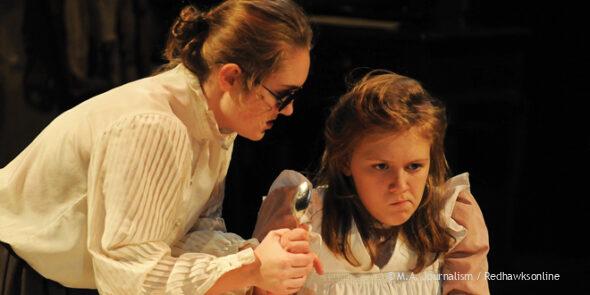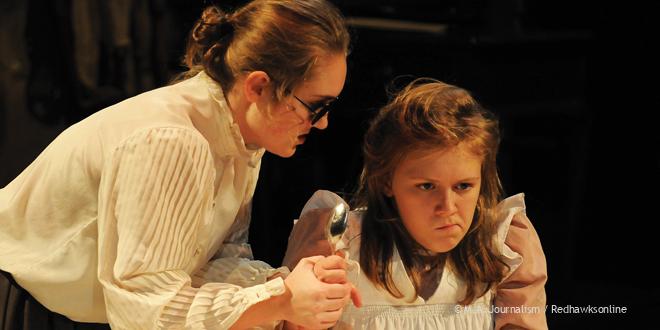“Imitate now, understand later”
Actors learn lessons from their roles in theater
A door opens and desperate hands grope for something, anything to guide them. Their owner, a young girl, shuffles forward with a doll clutched to her chest.
Another woman follows behind her, carrying a heavy suitcase, which slams on the floor and breaks the quiet of the room with its noise. The girl slams her hands onto the case, slapping on all edges to identify the item, unclasping the latch, pushing the lid back.
The other woman, her teacher, tugs the doll away and puts it behind her, warding off the angry arms of her student and the hits that come her way. She takes the girl’s hand and makes a series of sign language symbols on her palm, letting the girl feel each one.
“Imitate now, understand later!” said Annie Sullivan (senior Margot Leiner) forcefully during Minnehaha’s production of The Miracle Worker.
Helen’s hands clasp Annie’s, and with moans and grunts the girl repeats the same signs as her teacher, receiving her doll as a reward; the beginning of an amazing learning process for both women and the start of a young girl’s extraordinary life.
“The overall theme that we really clung to was that we have the power to unlock someone’s potential,” said theater teacher Nicholas Freeman, who also directed The Miracle Worker. “At the end of the play she [Helen Keller] dropped the glass pitcher, and the pitcher was supposed to shatter on the ground. The idea with that is that the glass ceiling is now broken, it’s now shattered. The sky’s the limit for her potential.”
The show provided a moving experience for cast and crew alike, and deeper lessons about blindness and unlocking potential were taught through the production.

Annie Sullivan (senior Margot Leiner) attempts to teach Helen Keller (sophomore Greta Hallberg) to eat with utensils during Minnehaha’s production of The Miracle Worker.
Minneapolis is a city full of the performing arts, with the second most theater seats per capita in the nation, according to Minneapolis.org. Theater is particularly unique, local professionals, actors, and directors say, in the way the audience is involved in a live performance and can experience individual moments in character’s stories.
“[In theater], you can invite the audience to consider a perspective that may not be their own,” said Dudley Voigt, manager of the Critical Review Program of Hennepin Theatre Trust. “It’s easier to do that when there are real live human beings on stage embodying a perspective that might be so different from your own. [Theater] humanizes things that otherwise might seem difficult or impenetrable or foreign.”
Actors can also experience the uniqueness of theater.
“Theater is a way for someone from any kind of background to experience a different way of life,” said sophomore Greta Hallberg, cast as Helen Keller in Minnehaha’s production of The Miracle Worker. “The whole point of theater is to take yourself out of your comfort zone…and experience someone else’s point of view. In theater, when you see people’s emotions and you see how they are reacting on stage, you get a better understanding of their point of view.”
In fact, research has shown that a fake emotion, or one that an actor is trying to portray, can trigger the same chemical release in an audience member’s brain as the real emotion would.
“Faking an emotion can trigger the same physiological response as the real emotion,” said Voigt. “There’s an actor, a live human being right in front of you and they’re expressing anger, I’m going to experience that as an audience member as real as if it were happening out in the world.”
This concept helps to understand why theater is so effective in letting audience members into the world of the characters on stage. While cast members have a different role to play, they are also able to learn from theater productions.
“I think as a cast member you realize that your job is to truly be in the moment and to be working off one another, the other actors on the stage,” said Freeman. “So, you don’t see the bigger picture as a cast member, but the audience gets to see the bigger picture. Your job as an actor is to make sure that that puzzle piece is placed where it needs to be placed and the audience gets to see the entire puzzle.”
The cast members of The Miracle Worker encountered the journey of Hallberg’s character, who played Helen Keller as a child, and also the journey of Annie Sullivan, Helen’s teacher. Annie helped Helen to unlock her potential, even though she was both blind and deaf.
Hallberg describes what it was like to act out being blind and how it made her feel.
“A couple of times [Mr. Freeman] had me do some stuff blindfolded, and it was scary,” she said. “What I felt was that, when you’re blind, when I couldn’t see, everyone knew something that I didn’t know and everyone had an advantage that I didn’t, and that’s scary. You have to really rely on someone else [when you’re blind]. If someone is leading you somewhere, you have trust them.”
The Miracle Worker demonstrates how theater has the ability to take a difficult issue and make it more comprehensible to both the audience and the cast and crew of the production.
Another play that may surprise audiences by teaching lessons or leaving the audience thinking deeply may not be expected: Peter Pan. Voigt describes how it impacted her and the lessons it teaches about adolescence and growing up, something that Peter vowed never to do.
“The other story that [stays with me] is Peter Pan,” she said. “I saw a production of it at Children’s Theater, and I had this experience of watching someone I know from college who was a grown man play Peter Pan and that was profound. I felt that there was just so much in Peter Pan about the adolescent experience.”
“The characters are all so stuck in their world,” she said. “Peter’s willing to give up all the joys and privileges of adulthood in order to avoid the responsibilities, and Wendy is just the reverse. What she wants so badly: motherhood, marriage, all these grown up things. And she gives up this adoration of Peter for an adult life. I think there’s a lot in that show about imagination and adventure.”
Peter Pan demonstrates that any well-performed play can have a deeper meaning and teach the audience something. Hallberg, for one, feels that her experiences on the cast of The Miracle Worker have taught her many lessons.
“I think it has taught me to appreciate sight and the ability to hear,” Hallberg said, reflecting on her character, Helen Keller, “and to appreciate her story because of what she had to overcome.”

